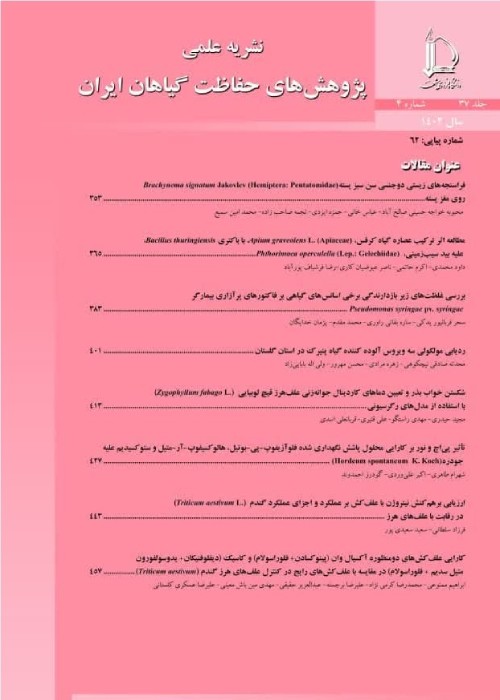The investigation (study) of toxicity Imidacoloprid, Acetamiprid, Pirimicarb and Diazinon on The Mortality of Rose Aphid, Macrosiphum rosae L. (Hem.: Aphididae)
Author(s):
Abstract:
Introduction
Rose Aphid, Macrosiphum rosae L. is one of the most important pests of rose which reducing the quality and quantity of products by attacking and hurting the leaves and branches. Aphids damage plants by sucking sap from plant tissues using highly specialized sucking mouth parts. The usual symptoms of damage are distortion of new leaves and flowers. Aphids damage plants by sucking sap from plant tissues using highly specialized sucking mouth parts. The usual symptoms of damage are distortion of new leaves and flowers. Neonicotinoids insecticides imidacloprid and Acetamiprid is, Which has the effect of sucking insects. The discovery of neonicotinoids as important novel insecticides has represented a milestone in insecticide research over the past three decades. The neonicotinoids represent the fastest-growing class of insecticides introduced to the market since the commercialization of pyrethroids. Diazinon is an organophoshates pesticides to combat pests such as aphids. Pirimicarb of group carbamate insecticides are effective against aphids are active on fruit trees and ornamental plants. Comparison of several insecticides and pesticides and recommend appropriate levels, to combat and prevent outbreaks of pests, can be of great help in pest control product is the increase in market. Materials And Methods
In this study, different concentrations of Acetamiprid and Imidacloprid with Pirimicarb and Diazinon on rose aphid mortality was compared to find the condition of mortality of Macrosiphum rosae as per field conditions in a randomized complete block design during 2011-2012. Each compound was used in 3 different concentration (recommended, higher and lower) including Imidacloprid (200, 600, 400 PPM), Acetamiprid (250, 500, 125 PPM), Primicarb (250, 500, 125 PPM) and Diazinon (500, 1000, 250 PPM) and effects checked on aerial organs and compared by sampling of population aphids on the period of "before, 3,5,7 and 14 days after" spraying.. Results And Discussion
results showed that the average mortality of aphids in three days after spraying, There is a significant difference between treatments and blocks, And the average aphid mortality at 5, 7 and 14 days after spraying, only the treatments, showed a significant difference. Recommended concentrations and higher imidacloprid and diazinon were in a group. The results showed that on the third day of treatment, Diazinon (500ppm) 73/46%, Imidacloprid (400 ppm) 88/77%, Acetamiprid (250ppm) 73/95% and primicarb (400ppm) with 72/8% had the greatest impact on aphid mortality, respectively. As per result the effects of Insecticide reduced to 14th day. Therefore, because of good performance of the neonicotinoid compounds, it can be effective in rose aphid control. The results indicated the suitability of the recommended concentration is well above the concentration, so no need to use higher concentrations. Low concentrations the recommended concentration decreases gradually as the impact on the fourteenth day and have minimal impact on mortality is low for crop growers. This group had different mode of action as compared to the previous insecticides. Imidacloprid was the first member of this family and was effective against many insects showing resistance to carbamates, organophoshates and pyrethroids. Acetamiprid belongs to the second generation of the nicotinoids. The present study demonstrated rose aphid population with neonicotinoid insecticides was significantly different neonicotinic insecticides (imidacloprid and acetamiprid) had the most effective on number of M. rosae. But the introduction of neonicotinoids in the form of imidacloprid and acetamiprid proved an immediate relief for crop growers. This group had different mode of action as compared to the previous insecticides. Neonicotinoid insecticides, such as imidacloprid, acetamiprid are commonly used against a wide range of herbivorous insect pests such as aphids, mealy bugs and whiteflies in greenhouses or farms. So, parasitoids and predators are exposed to these chemicals.Conclusion
Due to the losses caused by the toxins and the yield obtained in this study, recommended concentrations of insecticides neonicotinoid are best treatment to combat aphids onroses. The use of high aphid densities Imidacloprid and Acetamiprid in areas where spraying is needed more than once is recomended. our results showed that best effect belongs to recommended dose of Neonicotinoids compounds same as recommended dose for phosphates and carbamate compounds to control the Rose aphid.Language:
Persian
Published:
Journal of plant protection, Volume:29 Issue: 3, 2015
Pages:
466 to 469
magiran.com/p1501924
دانلود و مطالعه متن این مقاله با یکی از روشهای زیر امکان پذیر است:
اشتراک شخصی
با عضویت و پرداخت آنلاین حق اشتراک یکساله به مبلغ 1,390,000ريال میتوانید 70 عنوان مطلب دانلود کنید!
اشتراک سازمانی
به کتابخانه دانشگاه یا محل کار خود پیشنهاد کنید تا اشتراک سازمانی این پایگاه را برای دسترسی نامحدود همه کاربران به متن مطالب تهیه نمایند!
توجه!
- حق عضویت دریافتی صرف حمایت از نشریات عضو و نگهداری، تکمیل و توسعه مگیران میشود.
- پرداخت حق اشتراک و دانلود مقالات اجازه بازنشر آن در سایر رسانههای چاپی و دیجیتال را به کاربر نمیدهد.
In order to view content subscription is required
Personal subscription
Subscribe magiran.com for 70 € euros via PayPal and download 70 articles during a year.
Organization subscription
Please contact us to subscribe your university or library for unlimited access!


